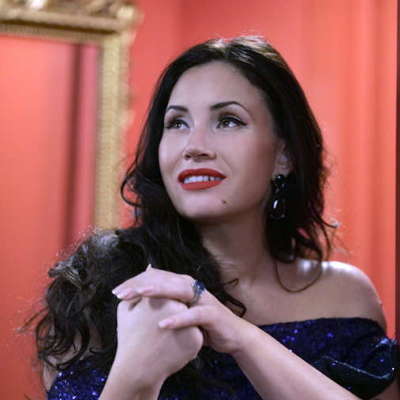- Jeff Talman
- Liadov
- Manus Carey
- Mobil Babayev
- Worshipful Company of Musicians
- Con te partirò
- Beethoven: Bagatelles
- Washington State
An Exhilarating Celebration of Purcell's Genius
MIKE WHEELER enjoys Opera North's 'eco-entertainment' based on music by Henry Purcell
Pasticcio, juke-box musical – whatever you want to call it, The Masque of Might is an 'eco-entertainment' - Opera North's description - devised by David Pountney, who also adapted the texts as appropriate, to a compilation of numbers from various odes and stage works by Purcell, the originals of which were helpfully listed in the printed programme - Theatre Royal, Nottingham, UK, 9 November 2023.
The scenario's cosmic scope was established by the opening video of stars and planets, the backdrop to the overture, taken from Purcell's score for Thomas Shadwell's Shakespeare adaptation The History of Timon of Athens the Man-hater (and there's a clue there as to how things develop).
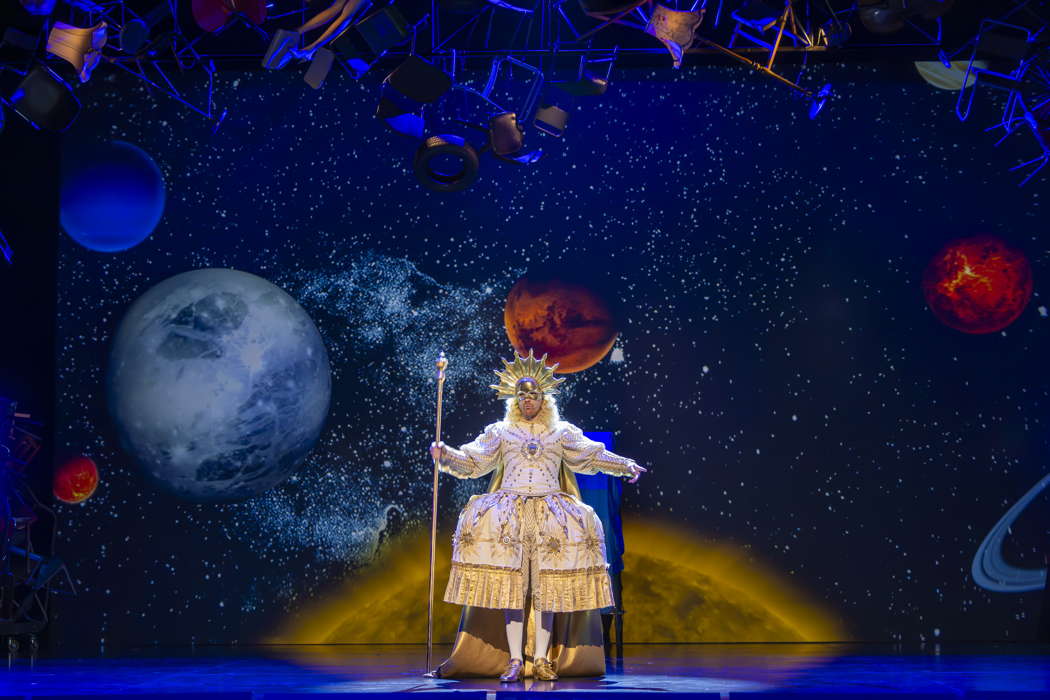
Andri Björn Róbertsson as Nebulous in Opera North's production of Masque of Might. Photo © 2023 James Glossop
The allegorical figures of Nebulous and Elena, in extravagant baroque theatrical costume, look down on the Earth in concern - 'Ye twice ten hundred deities', from The Indian Queen - as the future tyrant Diktat is born in an enormous pram, welcomed by the Sycophants – Tousel Blond and Strumpet Ginger, in brightly coloured suits and clown make-up – to the opening numbers of Come Ye Sons of Art.
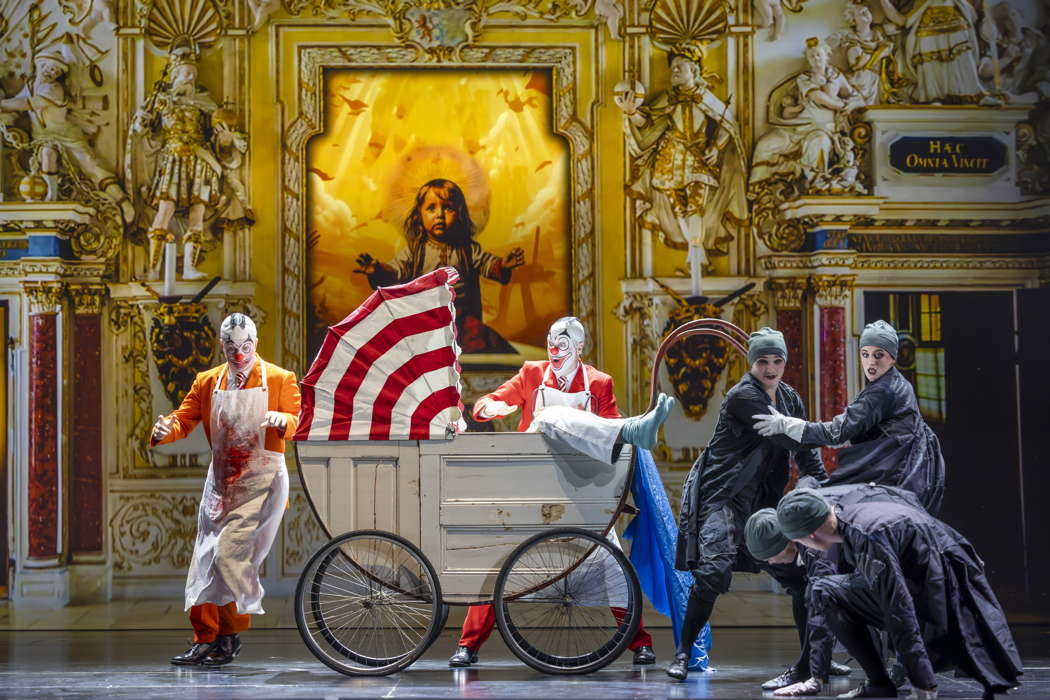
James Laing as Tousel Blond and James Hall as Strumpet Ginger with dancers Ben Yorke-Griffiths, Rose Ellen Lewis, Jonny Aubrey-Bentley and Ruby Portus in Opera North's production of Masque of Might. Photo © 2023 James Glossop
The adult Diktat is warned by Nebulous, now a climate activist, and his co-activist Scrofulous, about the state of the planet, but he throws them into prison, along with others, including Elena, who voice their despair - the short anthem Hear my Prayer, O Lord - as Nebulous is executed.
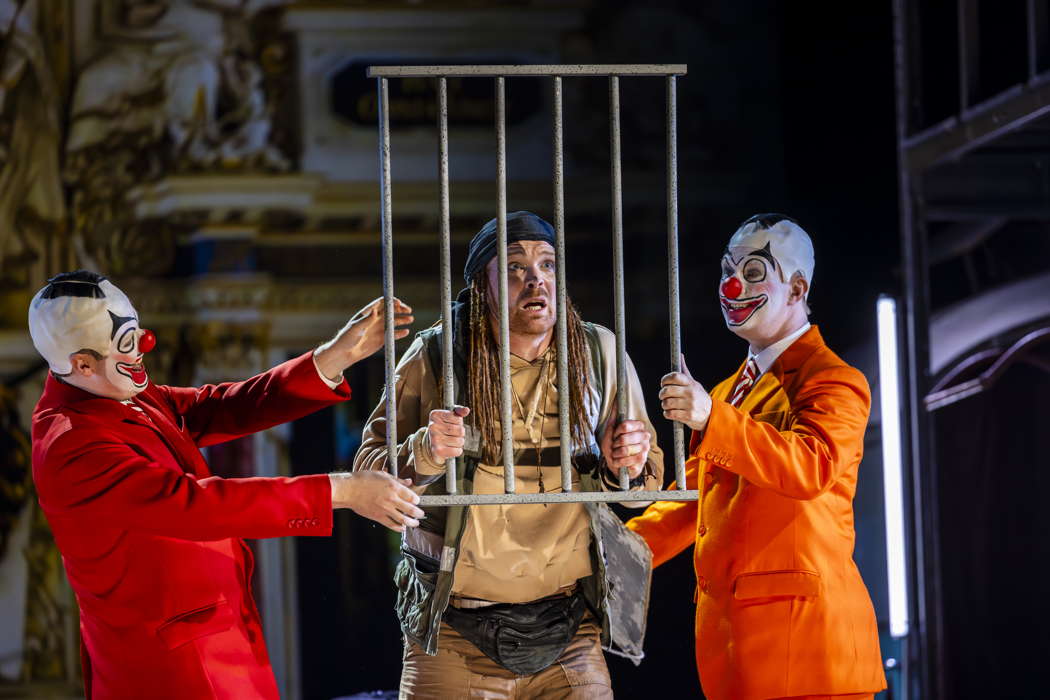
James Hall as Strumpet Ginger, Andri Björn Róbertsson as Nebulous and James Laing as Tousel Blond in Opera North's production of Masque of Might.
Photo © 2023 James Glossop
Elena's lament - 'O let me weep', from The Fairy Queen - forms a powerful curtain number to Part 1.
Part 2 finds Dikat putting on his strong ruler act - 'Great Diocles the boar has kill'd', adapted, from Dioclesian - with Elena forced to join in the adulation, as cheerleaders spell out Diktat's name in semaphore - 'Sing anthems' also from Dioclesian.
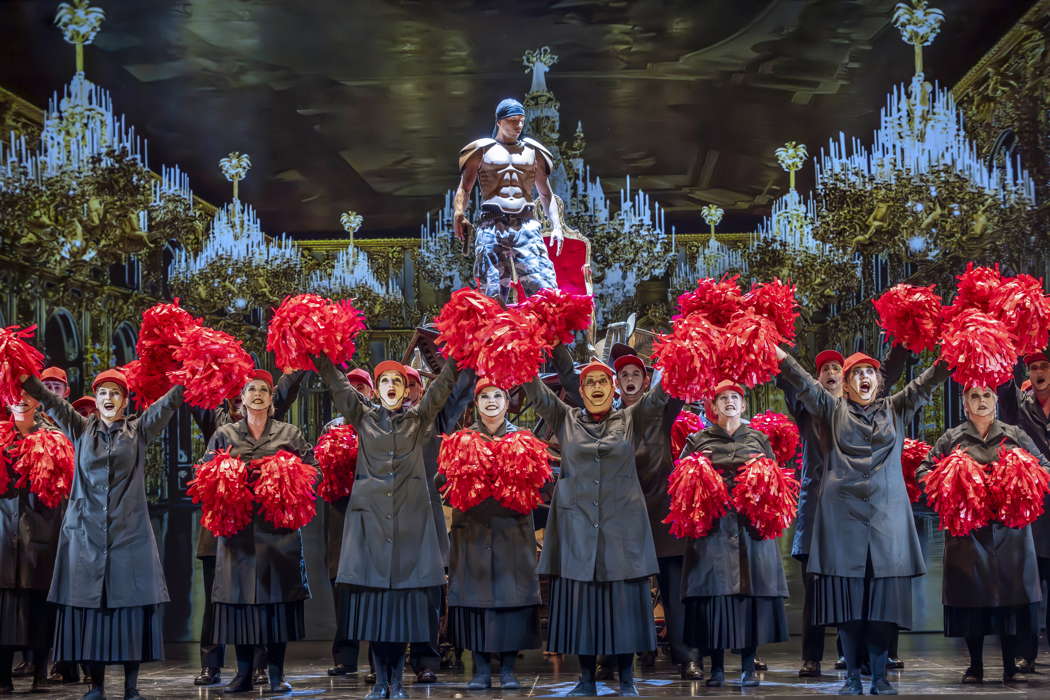
Callum Thorpe as Diktat with members of the Chorus of Opera North in David Pountney's production of Masque of Might. Photo © 2023 James Glossop
But opposition starts to grow - 'I fly from the place where flattery reigns', from The Indian Queen - and even Tousel and Strumpet are persuaded to change sides. Two new figures, Sceptic and Activist, appear, and Sceptic calls on nature to rise up against Diktat - 'Arise ye subterranean winds' from The Tempest, not now thought to be by Purcell, but a real show-stopper, all the same.
Diktat finds himself lost in the forest, as various animals emerge from hiding - three numbers from Hail! Bright Cecilia, with 'Tis nature's voice' providing a magical still moment. Diktat tries to assert himself, chain-saw in hand, but Sceptic and Activist are joined by Elena in summoning up the dead.
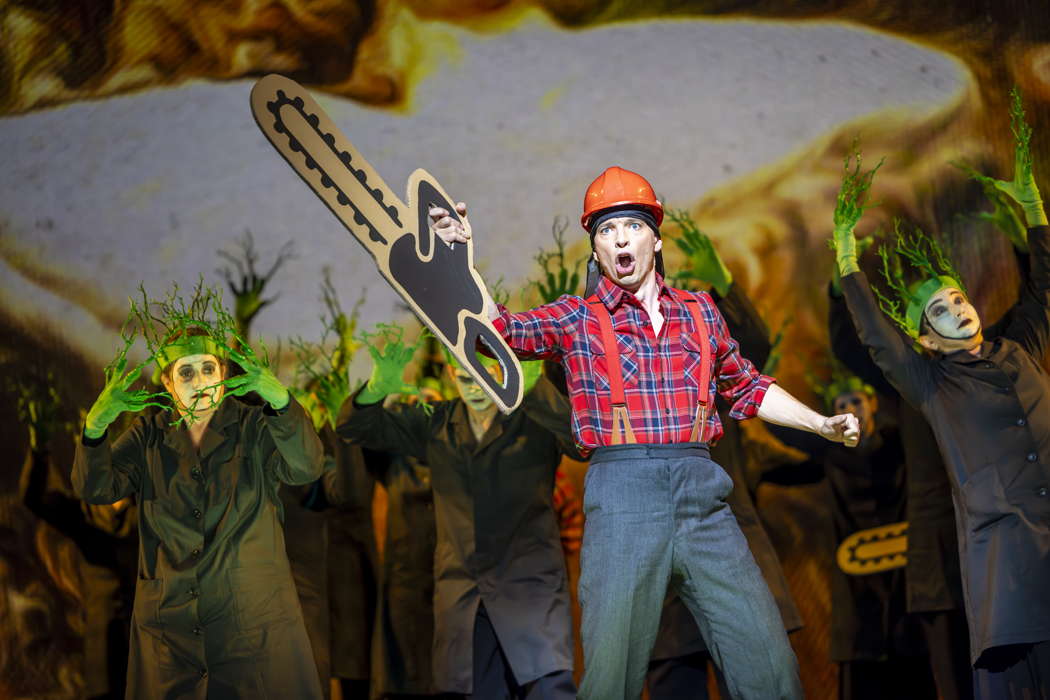
Callum Thorpe as Diktat with members of the Chorus of Opera North in David Pountney's production of Masque of Might. Photo © 2023 James Glossop
Desperate to know what lies ahead, Saul turns to a Seer, who warns him he can't escape his destiny, and stages a play-within-a-play, of Saul visiting the Witch of Endor - In Guilty Night.
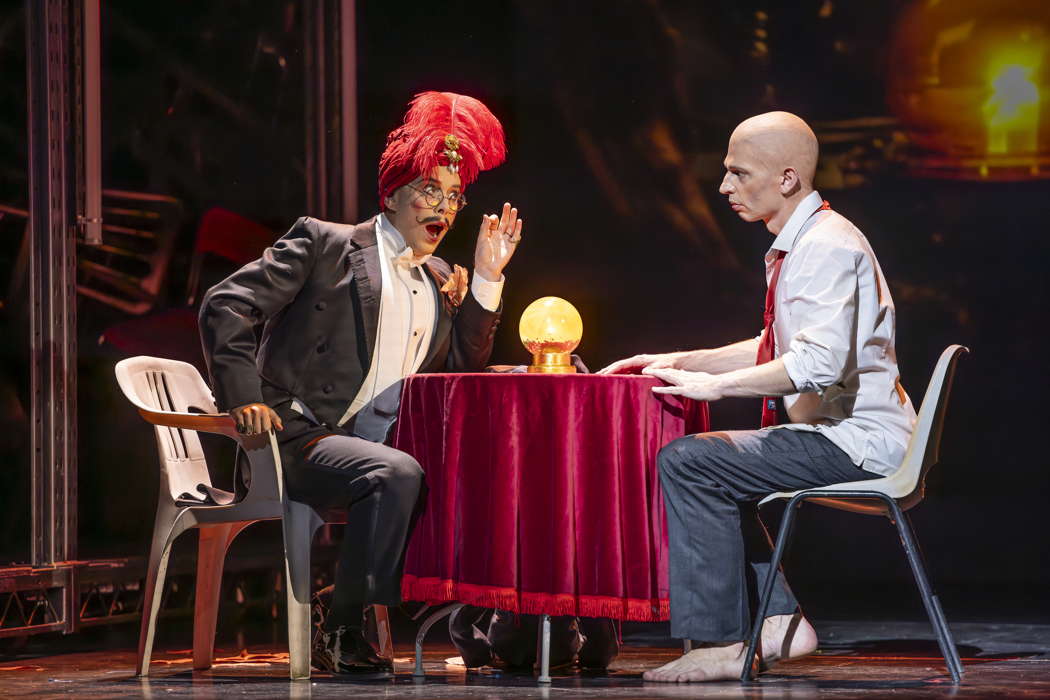
Xavier Hetherington as Seer with Callum Thorpe as Diktat in Opera North's production of Masque of Might. Photo © 2023 James Glossop
As Diktat's power crumbles, life begins to return to the earth, with a sequence of numbers from the 1691 Birthday Ode for Queen Mary, beginning with the overture accompanying a dance of sunflowers and bees, and bringing down the curtain with 'Welcome, glorious morn'.
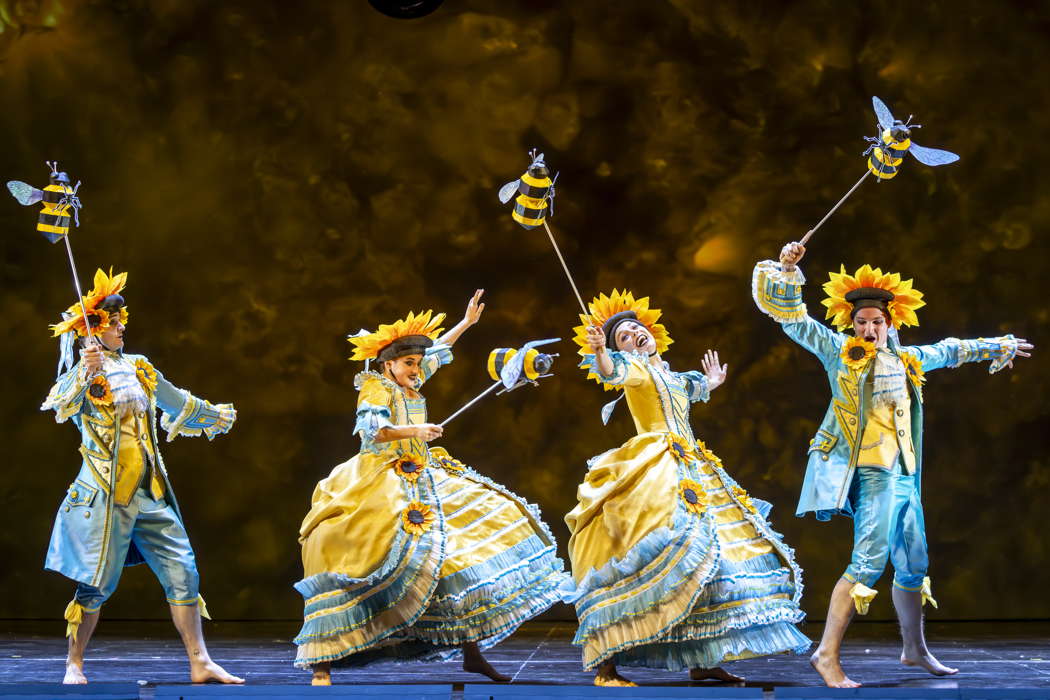
Jonny Aubrey-Bentley, Rose Ellen Lewis, Ruby Portus and Ben Yorke-Griffiths as the Masque of Might dancers. Photo © 2023 James Glossop
Callum Thorpe was a creepy Diktat, registering a real shock of recognition when Samuel appears. Amy Freston, standing in for an indisposed Anna Dennis, was a clear-toned Elena and a feisty Witch.

Amy Freston
As Tousel and Strumpet, James Laing and James Hall were a faultless double-act. Andri Björn Róbertsson's Nebulous, Xavier Hetherington's Scrofulous and Matthew Brook's Sceptic and Samuel (other members of the cast also doubled smaller roles) brought equal conviction to their characters.
Denni Sayers' choreography was a joy to watch, and video designer David Haneke produced unfailingly apt imagery, as did the design team of Leslie Travers, set, and Marie-Jeanne Lecca, costumes. The start of Act 2 saw Diktat enthroned on an improbably high stack of crazily-angled chairs; the caravan that acted as Falstaff's base earlier in the week returned as the Witch's hideout; and as the earth blooms again at the end, the pram was wheeled on, now planted up as a small wildflower meadow.
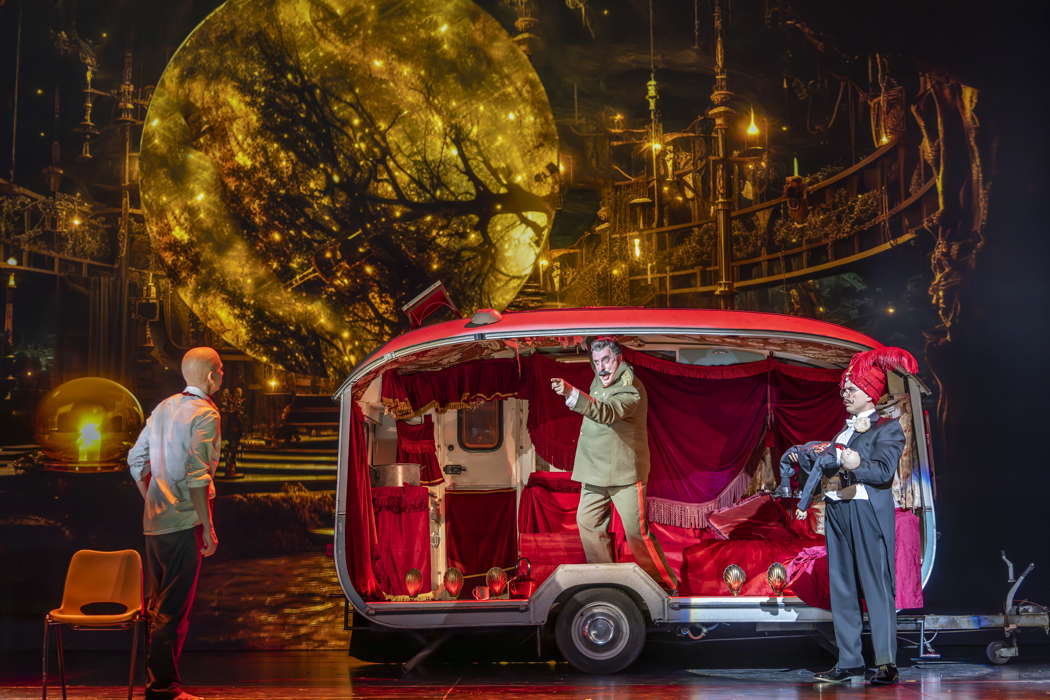
Callum Thorpe as Diktat, left, with Matthew Brook as Samuel in the Witch's caravan and Xavier Hetherington as Seer/Saul. Photo © 2023 James Glossop
The whole show was all the more effective for not being unduly preachy, while conductor Harry Bicket, and the Opera North chorus and orchestra on vigorous form, ensured that it also worked simply as an exhilarating celebration of Purcell's genius.
And, of course, any resemblances, or references, to actual world leaders, past or present, were purely coincidental.
Copyright © 20 November 2023
Mike Wheeler,
Derby UK




